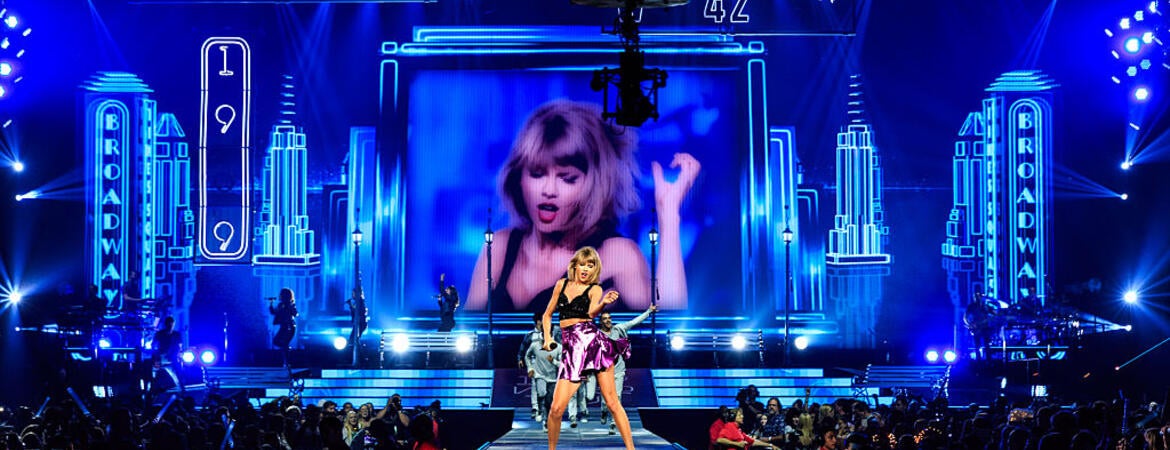
A chaotic rollout of tickets for Taylor Swift’s upcoming tour has drawn renewed scrutiny of whether Ticketmaster unfairly dominates the ticketing industry. We asked Carolyn Sloane, a UC Riverside economics professor, whether Ticketmaster has outsized influence on ticket prices. Sloane teaches a "Rockonomics" course and is a "Swiftie" — a Taylor Swift fan. Follow this link for a related Q&A with antitrust expert Ken MacVey.
Q: Why does the episode with Taylor Swift draw special attention to Ticketmaster? Is it more than her level of popularity?
Sloane: The music industry is small based on any economic metric we use to think about industry scale: employment, revenue, capital investment, even lobbying dollars. As a result, major economic trends are at times overlooked. That’s a loss. A lot of what’s happened and is happening in the music industry foretells seismic changes in the global economy: automation, inequality, lagging regulation, and consolidation. Literally every sector that makes up the music industry has meaningfully consolidated: record labels, radio, streaming platforms, physical product outlets, manufacturers of music physicals, live event spaces, live event promotion, and ticketing. While music industry insiders are keenly aware of consolidation, it has gone mostly unnoticed by the public.
However, music fans take notice when change affects them — their favorite band disappearing from a streaming platform or being locked out of the pre-sale for the biggest artist in the industry. Widespread economic pain or annoyance tends to garner public scrutiny.
Q: Those calling for antitrust action against Ticketmaster say it block rivals from entering the industry, overcharges, and provides poor service. Are they right?
Sloane: I do not have the information to speak to Ticketmaster’s specific business practices. There is a clear lack of competition in the ticketing space. Competition is a disciplining factor in markets, and in the absence of competition or effective regulation that keeps pace with innovation, there are just not strong enough incentives for firms in monopolistic or monopolistically competitive industries to behave well.
Q: Is Ticketmaster good for the music industry’s bottom line? Is it good for some in the music industry and not others?
Sloane: For most of the history of the music industry, live events were priced inefficiently. How do we know this? Many events sold out too quickly, and the secondary market (scalping) was profitable. That’s indicative that pricing was too low relative to consumers’ willingness to pay. A positive movement led by artists like Kid Rock, Bruce Springsteen, and Taylor Swift was to make scalping less profitable. They did this with creativity and nerve and sometimes with the assistance of Ticketmaster through the Verified Fan program. You can see this in a startling way with the Taylor Swift Reputation tour, where only 3% of the Verified Fans tickets made it to scalpers compared to 30-50% for a typical stadium tour.
Reducing the profitability of scalpers is welfare-improving. Why? If more money diverts away from scalpers and is passed through to artists, that’s a good thing because it means the people that help make the art and pull off the live events like event staff, security, road crew, merchandise salespeople, and supporting musicians can see more of those returns. If a ticketer or promoter has outsized market power relative to the artist, the pass-through effect will be more muted.
Q: Is Ticketmaster good for consumers?
Sloane: On the consumer side, Ticketmaster and other ticketers get possibly well-deserved scorn for charging high fees. A more balanced view would acknowledge that Ticketmaster and other ticketers like AXS have made positive contributions through their investments in technology which have certainly reduced search costs and streamlined the purchasing process for fans.
Q: What role do musicians like Swift have in setting ticket prices?
Sloane: The role any artist has in influencing ticket prices depends on many factors: where an artist is in their career, the sophistication of their team, the kind of venues they are performing in, the extent to which the event requires external promotion, their relationships with promoters, and even their personal ethics. There are two artists who we probably know the most about in terms of their influence on the pricing of events because they’ve led change in that space and there’s been some good reporting on it: Kid Rock and Taylor Swift. I do not think I have a lot of value to add on those topics beyond pointing you towards compelling reporting here and here.
Q: What does a music industry without ticket scalpers look like?
Sloane: We will never have a live event market without a secondary market. People have unpredictable schedules and that makes secondary transactions in the live event space particularly helpful. Sometimes, we just can’t find a sitter in time to make it to the show, but what if someone else found a sitter and would love to take the ticket off our hands? Allowing that transaction to take place is great for both parties!
While bots and scalpers may drive prices closer to fans’ willingness to pay, the artist and venues do not see any part of that increase, so it does not go back in the hands of the people who make or support the art. That’s not great. Reducing scalping, especially less bulk scalping using bots, would be better for both fans and artists. In contrast, an efficient secondary market that allows fans to flake out of events if they need to and other fans to bounce into events at the last minute, is a good thing. In recent years we have seen increased original ticketer involvement in secondary transactions through programs where ticket holders can only resell through the original ticketer such as Ticketmaster or AXS. Those types of reselling programs decrease incentives for bots and scammers potentially benefitting consumers, artists, and venues.



